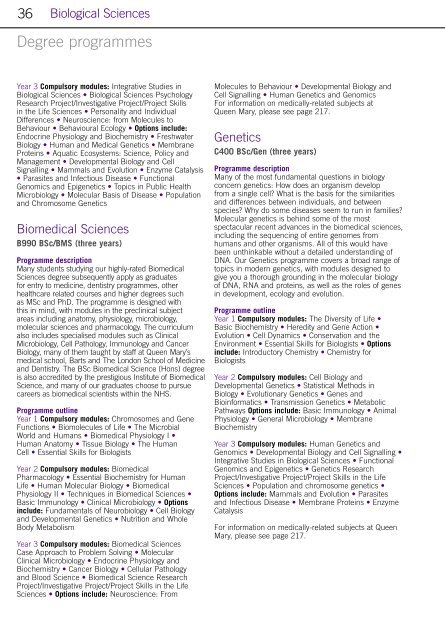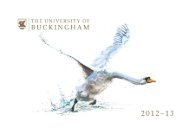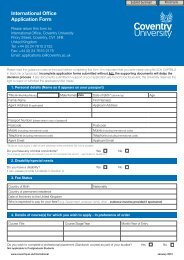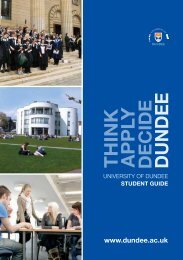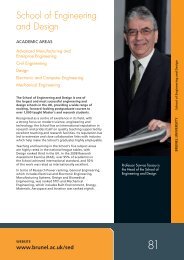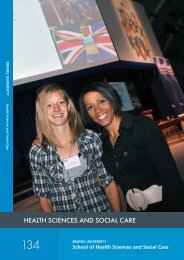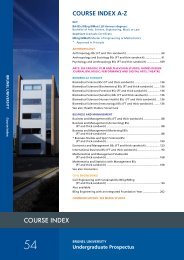student profile
student profile
student profile
You also want an ePaper? Increase the reach of your titles
YUMPU automatically turns print PDFs into web optimized ePapers that Google loves.
36<br />
Biological Sciences<br />
Degree programmes<br />
Year 3 Compulsory modules: Integrative Studies in<br />
Biological Sciences • Biological Sciences Psychology<br />
Research Project/Investigative Project/Project Skills<br />
in the Life Sciences • Personality and Individual<br />
Differences • Neuroscience: from Molecules to<br />
Behaviour • Behavioural Ecology • Options include:<br />
Endocrine Physiology and Biochemistry • Freshwater<br />
Biology • Human and Medical Genetics • Membrane<br />
Proteins • Aquatic Ecosystems: Science, Policy and<br />
Management • Developmental Biology and Cell<br />
Signalling • Mammals and Evolution • Enzyme Catalysis<br />
• Parasites and Infectious Disease • Functional<br />
Genomics and Epigenetics • Topics in Public Health<br />
Microbiology • Molecular Basis of Disease • Population<br />
and Chromosome Genetics<br />
Biomedical Sciences<br />
B990 BSc/BMS (three years)<br />
Programme description<br />
Many <strong>student</strong>s studying our highly-rated Biomedical<br />
Sciences degree subsequently apply as graduates<br />
for entry to medicine, dentistry programmes, other<br />
healthcare related courses and higher degrees such<br />
as MSc and PhD. The programme is designed with<br />
this in mind, with modules in the preclinical subject<br />
areas including anatomy, physiology, microbiology,<br />
molecular sciences and pharmacology. The curriculum<br />
also includes specialised modules such as Clinical<br />
Microbiology, Cell Pathology, Immunology and Cancer<br />
Biology, many of them taught by staff at Queen Mary’s<br />
medical school, Barts and The London School of Medicine<br />
and Dentistry. The BSc Biomedical Science (Hons) degree<br />
is also accredited by the prestigious Institute of Biomedical<br />
Science, and many of our graduates choose to pursue<br />
careers as biomedical scientists within the NHS.<br />
Programme outline<br />
Year 1 Compulsory modules: Chromosomes and Gene<br />
Functions • Biomolecules of Life • The Microbial<br />
World and Humans • Biomedical Physiology I •<br />
Human Anatomy • Tissue Biology • The Human<br />
Cell • Essential Skills for Biologists<br />
Year 2 Compulsory modules: Biomedical<br />
Pharmacology • Essential Biochemistry for Human<br />
Life • Human Molecular Biology • Biomedical<br />
Physiology II • Techniques in Biomedical Sciences •<br />
Basic Immunology • Clinical Microbiology • Options<br />
include: Fundamentals of Neurobiology • Cell Biology<br />
and Developmental Genetics • Nutrition and Whole<br />
Body Metabolism<br />
Year 3 Compulsory modules: Biomedical Sciences<br />
Case Approach to Problem Solving • Molecular<br />
Clinical Microbiology • Endocrine Physiology and<br />
Biochemistry • Cancer Biology • Cellular Pathology<br />
and Blood Science • Biomedical Science Research<br />
Project/Investigative Project/Project Skills in the Life<br />
Sciences • Options include: Neuroscience: From<br />
Molecules to Behaviour • Developmental Biology and<br />
Cell Signalling • Human Genetics and Genomics<br />
For information on medically-related subjects at<br />
Queen Mary, please see page 217.<br />
Genetics<br />
C400 BSc/Gen (three years)<br />
Programme description<br />
Many of the most fundamental questions in biology<br />
concern genetics: How does an organism develop<br />
from a single cell What is the basis for the similarities<br />
and differences between individuals, and between<br />
species Why do some diseases seem to run in families<br />
Molecular genetics is behind some of the most<br />
spectacular recent advances in the biomedical sciences,<br />
including the sequencing of entire genomes from<br />
humans and other organisms. All of this would have<br />
been unthinkable without a detailed understanding of<br />
DNA. Our Genetics programme covers a broad range of<br />
topics in modern genetics, with modules designed to<br />
give you a thorough grounding in the molecular biology<br />
of DNA, RNA and proteins, as well as the roles of genes<br />
in development, ecology and evolution.<br />
Programme outline<br />
Year 1 Compulsory modules: The Diversity of Life •<br />
Basic Biochemistry • Heredity and Gene Action •<br />
Evolution • Cell Dynamics • Conservation and the<br />
Environment • Essential Skills for Biologists • Options<br />
include: Introductory Chemistry • Chemistry for<br />
Biologists<br />
Year 2 Compulsory modules: Cell Biology and<br />
Developmental Genetics • Statistical Methods in<br />
Biology • Evolutionary Genetics • Genes and<br />
Bioinformatics • Transmission Genetics • Metabolic<br />
Pathways Options include: Basic Immunology • Animal<br />
Physiology • General Microbiology • Membrane<br />
Biochemistry<br />
Year 3 Compulsory modules: Human Genetics and<br />
Genomics • Developmental Biology and Cell Signalling •<br />
Integrative Studies in Biological Sciences • Functional<br />
Genomics and Epigenetics • Genetics Research<br />
Project/Investigative Project/Project Skills in the Life<br />
Sciences • Population and chromosome genetics •<br />
Options include: Mammals and Evolution • Parasites<br />
and Infectious Disease • Membrane Proteins • Enzyme<br />
Catalysis<br />
For information on medically-related subjects at Queen<br />
Mary, please see page 217.


